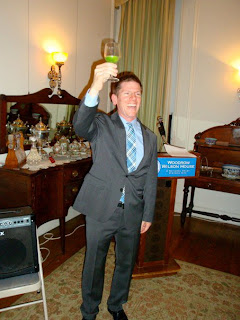You often hear about authors being paid an "advance," but just what is it? An advance is a pre-payment on your future royalties. This
is the publisher’s swag on how many copies they think you’ll sell for a book
title. You won’t get another royalty check until you exceed the sales
forecasted in the advance. For many authors, the advance is the only money
they’ll ever see. Most books only sell a few thousand copies.
Read that again: most
books sell only a few thousand copies. At most.
For first-time writers, your advance will be small, unless
you are a major public figure. Bill Clinton got $10 million for My
Life. His wife Hillary was paid $8 million for Living
History. Alan Greenspan got $8.5 million for The
Age of Turbulence. Senator Ted Kennedy received $8 million for True
Compass (published posthumously). Tony Blair, former prime minister of
Great Britain, got $9 million to pen his memoirs A
Journey: My Political Life. Sarah Palin got $5 million for Going
Rogue. How’d their agents get the advances so high? They sold the books
via an auction until one bidder finally emerged as the winner. But unless
you’ve been the head of state, you won’t see an advance anywhere near what
these people made.
The major publishers throw immense resources at books they
hope will be blockbusters. The Wall
Street Journal reported, “With such high stakes and money tied up in a few
big projects in the pipeline, the need to score big with a next project becomes
more pressing, and the process repeats itself. The result is a spiral of
ever-increasing bets on the most promising concepts, creating a ‘blockbuster
trap.’” (Anita Elberse, “Blockbuster or Bust,” WSJ, January 3–4, 2009). Publishing, like major league sports, has
become a winner-take-all game, where a few authors get much of the publisher’s
attention (and marketing dollars), while the vast majority of books are simply
distributed with little fanfare or support.
I remember seeing a full-page, color ad in The Washington Post for David Plouffe’s The
Audacity to Win: The Inside Story and Lessons of Barack Obama’s Historic Victory
(2009). Plouffe was Obama’s campaign manager, and the publisher purchased this
tremendously expensive advertisement. It must have cost them tens of thousands
of dollars. It was an example of how high the stakes are – and how much the
publishers need these expensive books to pay off.
Journalist and literary critic H.L. Mencken didn’t think too
highly of the advance system, and he was a man who wrote some thirty books. He
wrote in his memoirs:
"I have always
refused to take advances on my books, and I have urged Knopf to cease giving
them to other authors. More than once, sitting at the board table of Alfred A.
Knopf, Inc., I have heard him report substantial payments to frauds who have
made off without producing anything printable – payments that have swelled
unpleasantly the profit-and-loss account of the company. He insists, however,
that he must follow the trade practice, or lose good books. As for me, I’d
rather lose them than pay tribute to a gang of swindlers. Very few really
competent and worthwhile writers, I am convinced, would go away if advances
were suspended – and the money now wasted upon them might be used to increase
the royalties of men and women who produce profit for the house. But the
publishing business, like every other American business, is burdened with many
evil precedents and traditions, and such vain expenditures are among them."
Mencken had a way with words, didn’t he? A “gang of
swindlers”… that’s us writers!
Publishers for years have been talking about reforming the
advance system, and advance payments are getting smaller for rank-and-file
writers. Yet they haven’t been able to make a clean break from this system:
whenever a big name author throws a book into the ring, the major publishers
all bid on it, sending the advance price higher and higher.
I’m no public figure, though I have published three
books. So what kind of advances have I been paid? Well, my first book, The
Prohibition Hangover, got a four-figure advance. My next two books
earned no advances at all: the History Press simply doesn’t pay them. I make it
up with royalties on the back end.
*Mencken’s memoirs weren’t published until 1992. He
stipulated in his will that the memoirs were to be embargoed for thirty-five
years, and that way all the people he wrote about would be dead. Jonathan
Yardley, a book reviewer for
The
Washington Post, edited the memoirs. In that tome I also found Mencken’s
recipe for the “Coffin Varnish,” a boozy martini, and included this in
Prohibition
in Washington, D.C.
"Some time before the
Thirteen Awful Years [Prohibition] began, we had acquired in Del Pezzo’s
restaurant, then in 33rd Street opposite the Pennsylvania Station, the formula
of a cocktail that we called the Coffin Varnish – one-third vermouth,
two-thirds gin, and a dash of the Italian bitters, Fernet Branca – and this we
served to our guests."
Cheers!
Garrett Peck


